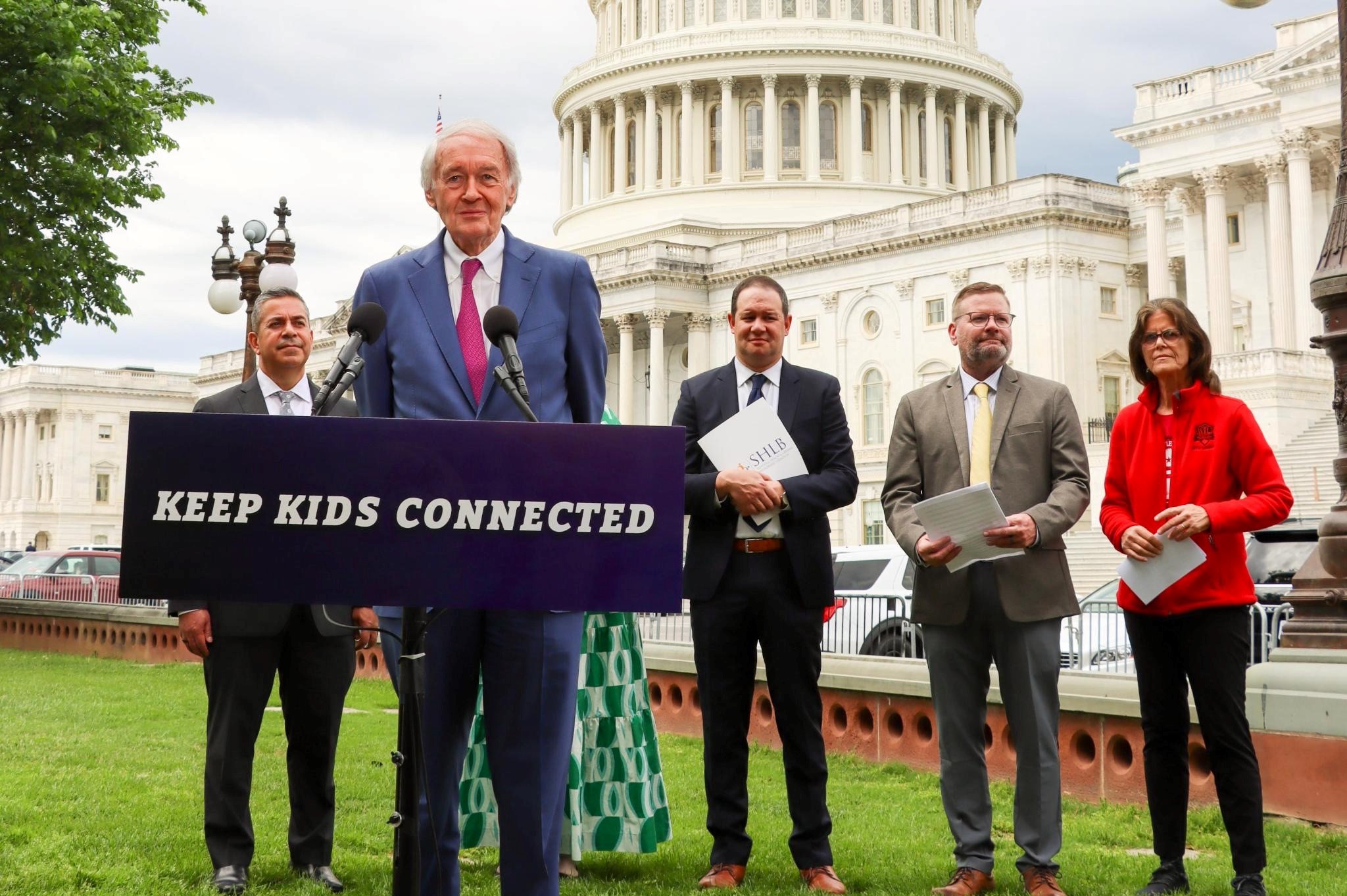
Senators Markey, Luján, joined by E-Rate advocates
Washington (May 8, 2025) - Senator Edward J. Markey (D-Mass.), a member of the Commerce, Science, and Transportation Committee, Senate Democratic Leader Chuck Schumer (D-N.Y.), and Senator Ben Ray Luján (D-N.M.), along with advocates from the Schools Health and Libraries Broadband (SHLB) Coalition, the American Library Association (ALA), the School Superintendents Association (AASA), and the Washington Teachers’ Union (WTU) today held a press conference on Republican attempts to gut low-income and rural students’ access to Wi-Fi internet hotspots. Senate Republicans voted Thursday to overturn a Federal Communications Commission (FCC) rule allowing schools and libraries to use their E-Rate funds to loan Wi-Fi hotspots to students and educators.
“Today is a deeply disappointing day for students across the country, especially those living in rural and underserved communities. Today, Senate Republicans will vote to repeal a rule from the FCC to provide Wi-Fi hotspots to students at home. With this vote, Republicans are abandoning millions of students who lack the internet access needed to complete their homework, attend class, and reach their full potential,” said Senator Markey. “It is unfair. And it is cruel. This repeal doesn’t make our schools stronger. It doesn’t make our libraries better. It doesn’t improve student outcomes. It doesn’t save the government money. All it does is strip away a lifeline.”
“For years, Senate Democrats have worked to close the digital divide, and this vote would blow a gaping hole in those efforts and set back years of progress. Access to high speed internet is not a luxury, it is a necessity – a utility as vital as electricity that people need to stay connected to the world and those they love,” said Leader Schumer. “Whether you are a student doing your homework, a veteran looking for job opportunities, senior utilizing telehealth, or someone reaching out during experiencing an emergency who needs internet access, E-rate is essential. I urge our Republican colleagues to stand up to DOGE and reconsider this vote. The American people are watching and they are feeling the effects of this slash and burn administration.”
“Across the country, the E-Rate program has helped connect millions of students to the internet they need to succeed in today’s world – especially in the most rural parts of America. Under the FCC’s Wi-Fi hotspots rule, schools and libraries across America can provide Wi-Fi hotspots to students and educators to use at home,” said Senator Luján, Ranking Member of the Telecommunications and Media Subcommittee. “Senate Republicans just passed a partisan resolution that would rob our students and educators of the very tools they need to succeed. When we should be increasing connectivity, my Republican colleagues are working to limit it.”
“This vote is a setback for the millions of students, library patrons, and patients who depend on hotspot access to stay connected,” said Joey Wender, Executive Director of SHLB. “But our fight isn’t over. SHLB remains committed to defending digital opportunity, and we are hopeful that the House will see the harm this resolution would cause and choose a better path forward. Communities across the country, including rural and underserved areas, are counting on it.”
“This disappointing vote doesn't need to become law if Congress considers how many constituents are benefitting - and will benefit in the future from this program. The enthusiasm for this vote was low. E-Rate, supported financially by the Universal Service Fund, is wildly popular. Hotspots provided through the federal E-Rate program offer a flexible, at-home opportunity for internet access, which individuals and families need, along with digital skills training. Libraries are uniquely suited to provide supportive connectivity and foster digital resilience,” said Cindy Hohl, President of the American Library Association.
“As the national voice for more than 13,000 superintendents serving America's public schools, we are speaking up about the danger of exacerbating a digital divide that disproportionately affects low-income, rural, and historically underserved children. This resolution would have a devastating impact on students and families who rely on internet access beyond the classroom. There are currently 20,000 school and library applications for hotspot and internet access - if it passes, students and patrons will be left offline and left behind. For many children, this program is the sole reason they are able to stay connected, keep up with their peers, complete homework, access digital learning tools, and be prepared to join the modern economy. Now is not the time to roll back access and connectivity, AASA urges members of the Senate to vote NO on S.J.Res.7,” said David Schuler, Executive Director of the AASA, the School Superintendents Association.
Senator Markey is the House author of the original E-Rate program, which has invested over $62 billion to connect schools and libraries to the internet across the country. Massachusetts schools and libraries have received more than $930 million from the E-Rate program and another $97 million from the Emergency Connectivity Fund, a $7 billion program that Senators Markey and Chris Van Hollen (D-Md.) created within the American Rescue Plan to provide devices and connectivity for students and educators at home.
###